外研版(2019)高中英语必修3课文解析:Unit 1 Knowing me,knowing you Developing ideas 课件 (18张ppt)
文档属性
| 名称 | 外研版(2019)高中英语必修3课文解析:Unit 1 Knowing me,knowing you Developing ideas 课件 (18张ppt) |
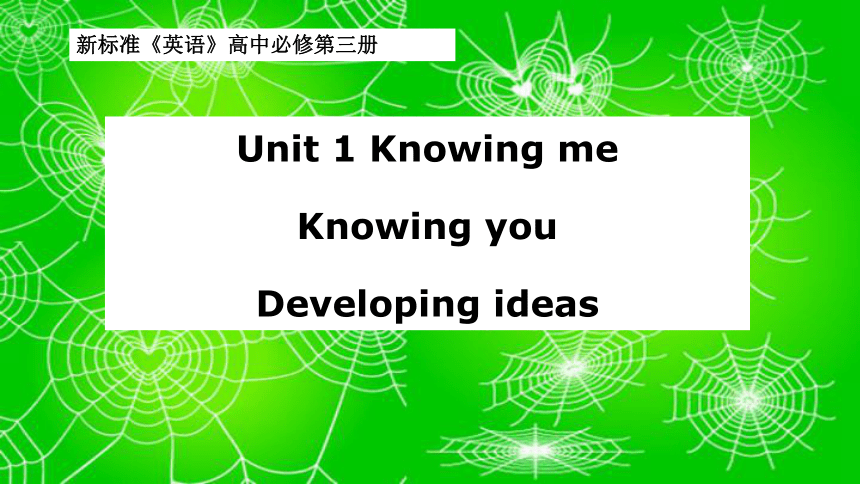
|
|
| 格式 | pptx | ||
| 文件大小 | 1.6MB | ||
| 资源类型 | 教案 | ||
| 版本资源 | 外研版(2019) | ||
| 科目 | 英语 | ||
| 更新时间 | 2021-06-20 00:00:00 | ||
图片预览

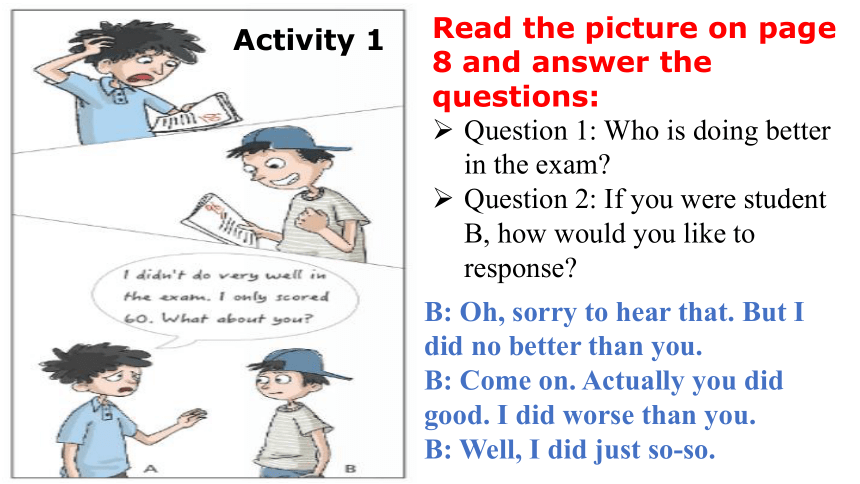
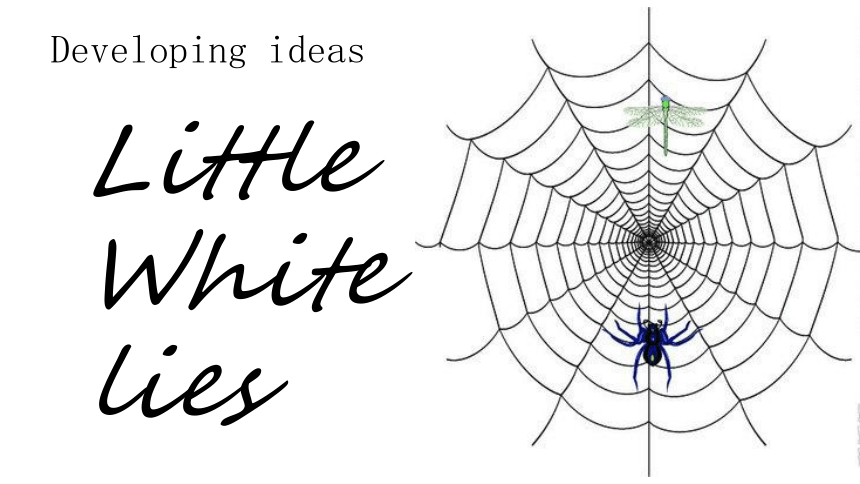
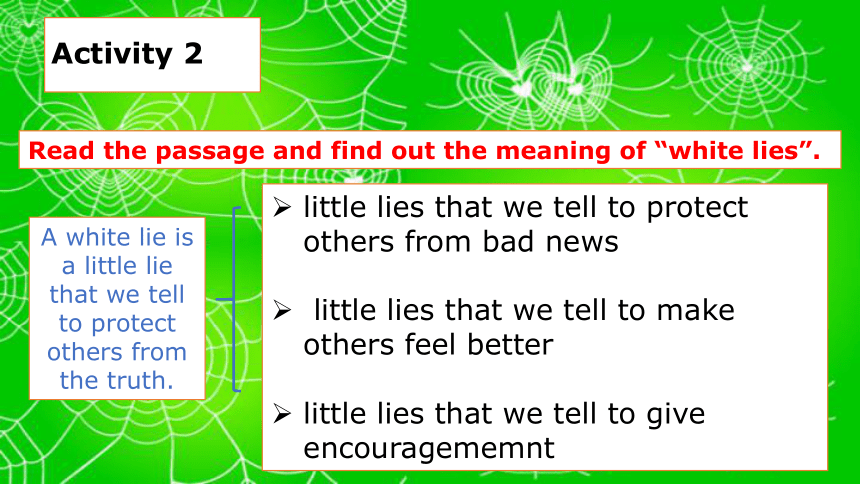
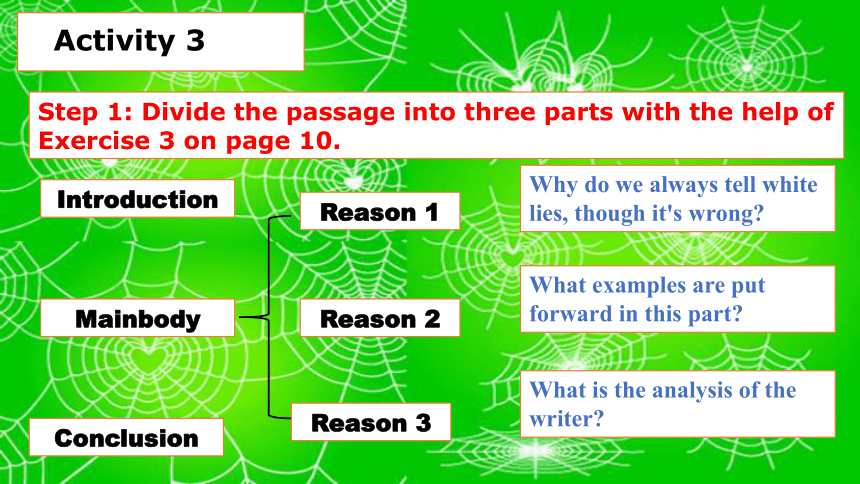
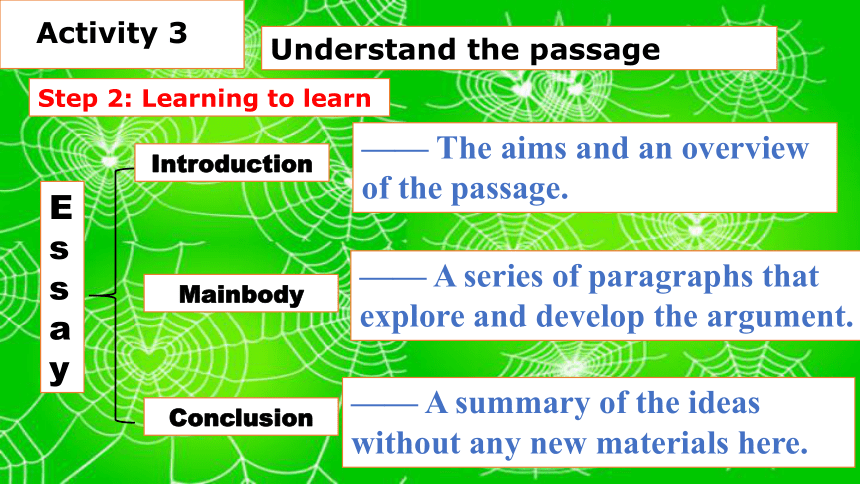
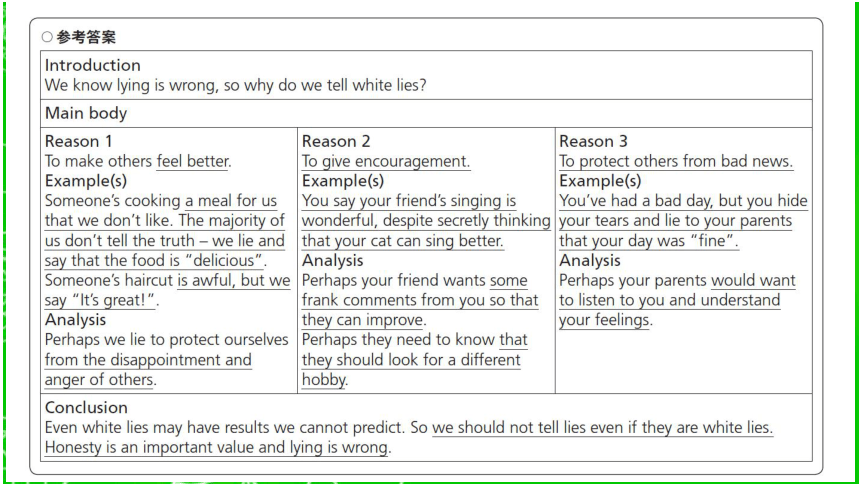
文档简介
Unit 1 Knowing me
Knowing you
Developing ideas
新标准《英语》高中必修第三册
Read the picture on page 8 and answer the questions:
Question 1: Who is doing better in the exam?
Question 2: If you were student B, how would you like to response?
B: Oh, sorry to hear that. But I did no better than you.
B: Come on. Actually you did good. I did worse than you.
B: Well, I did just so-so.
Activity 1
Developing ideas
Little
White
lies
Activity 2
Read the passage and find out the meaning of “white lies”.
little lies that we tell to protect others from bad news
little lies that we tell to make others feel better
little lies that we tell to give encouragememnt
A white lie is a little lie that we tell to protect others from the truth.
Activity 3
Step 1: Divide the passage into three parts with the help of Exercise 3 on page 10.
Introduction
Mainbody
Conclusion
Reason 1
Reason 2
Reason 3
Why do we always tell white lies, though it's wrong?
What examples are put forward in this part?
What is the analysis of the writer?
Activity 3
Understand the passage
Step 2: Learning to learn
Essay
Introduction
Mainbody
Conclusion
—— The aims and an overview of the passage.
—— A series of paragraphs that explore and develop the argument.
—— A summary of the ideas without any new materials here.
Think & Share
1 What does the “web” in the poem represent?
It represents a complicated situation, in which
once we tell a lie, we have to continue to tell more
other lies in order to cover the previous ones.
Think & Share
2 What would you do in the situations described in the passage?
3 What do you think is the difference between a lie and a white lie?
4 How would you feel if you were told a white lie? Share your experience with the class if this has happened to you.
2 Students’ own answers.
3 A lie is told to cover the truth in order to benefit yourself, which can be harmful to others. A white lie is told to avoid hurting others, without bad intention.
4 Students’ own answers.
Activity 4
Post reading
Work in groups. Give a talk on the importance of honesty following the steps below.
Explain what honesty is.
Give reasons for the important of being honest.
Support your reasons with examples.
End with your conclusion
Little White lies善意的小小谎言
1 Written more than two hundred years ago,these lines by Walter Scott remain one of the most well-known excerpts of Scottish poetry:
Oh, what a tanrgled web we weave,When first we practise to deceive!
200多年前,沃尔特.司各特写下的这几行文字,如今依然是苏格兰诗歌
中最广为传诵的诗句之一:
啊,
谎言一旦开始,我们须得织就-张错综复杂的网!
2| We all know that honesty is an important value and that lying is wrong, but who can honestly say that they've never told a lie? Perhaps we comfort ourselves with the knowledge that most of the lies we tell are “white lies": lttle lies that we tell to protect others from the truth.
我们都知道诚实是-项重要品质,也知道说谎是不对的。但是谁又能诚实地说自己从来没有说过谎呢?或许我们可以安慰自己,我们说过的大部分谎言都是“善意的谎言”,即为了保护他人不被真相伤害而撒的小谎。.
3 We've all surely had the experience of someone cooking a meal for us that we don't like. The majority of us of course don't tell the truth - we lie and say that the food is “delicious".
4 Or if a friend asks us what we think of their new haircut, we say“Ir's great!", even if we think it's awful. But to what extent can we justify tlling white lies like these?
3 我们一-定都有过这样的经历:别人为我们准备的菜肴不合我们的口味。大多数人会理所当然地把真实想法隐藏起来--我们会撒谎说这道菜“很好吃”
4 或者有朋友问我们他的新发型怎么样,即使我们觉得剪得非常糟糕,也会说“棒极了!”但是这些善意的谎言到底有多正当呢?
5 One of the main reasons for tlling a white lie is to try to make others feel better. However, when we lie and say that someone's haircut looks good, or when we say that we love a meal that we secretly hate, are we really hoping to improve the situation for someone else? Perhaps we are in fact lying to protect ourselves from the disappointment and anger of others.
说善意的谎言,主要原因之一是为了照顾别人的感受。但是,当我们撒谎说某人的发型很好看,或者说不合我们口味的菜很好吃时,我们真的是在为别人着想吗?也许事实上,我们撒谎只是为了不让别人失望和生气,以免殃及自身。
6
Another reason for tlling a white lie is to give encouragement. Say for example that your friend asks you what you think of his singing. You of course say that it's wonderful, despite secretly thinking that your cat can sing better. Stop for a moment and consider that perhaps your friend wants some frank comments from you so that they can improve. Or perhaps, they need to know that they should look
for a different hobby.
说善意的谎言的另一个原因是给予鼓励。比如说,你的朋友问你觉得他的歌唱得怎么样。尽管你私下里认为他唱得还不如猫叫好听,但还是说他的歌声很美妙。停下来想一想,也许你的朋友就是想听到你的真实评价,从
而改进和提高。又或者,应该让他知道自己需要换一个爱好了。
”Finally, we may also tell a white lie when we want to protect others from bad news. If you've had a bad day, do you tell your parents about it, or do you hide your tears and lie that your day was“fine"? If the latter, don't you think your parents would want to listen to you and understand your feelings? Wouldn't it be better to respect their concern for you and ask for their advice?
最后,想要向别人隐瞒坏消息的时候,我们可能也会说善意的谎言。假如你今天过得很糟糕,你是对你的父母说实话呢,还是偷偷擦掉眼泪骗他们说今天过得“不错”?如果你选择隐瞒,难道你不觉得其实父母希望听你倾诉从而理解你的真实感受吗?尊重他们对你的关心,向他们寻求建议不是更好吗?
8 Going back to Walter Scott's lines, we may find even white lies have results we cannot know in advance. Perhaps the meal you said was“delicious" will be served every time you visit. Would your friend trust your opinion again if he found out you had lied about his“wonderful" singing: How would you expect others to truly understand your emotions if you only shared good news instead of bad? Moreover, how would you feel if you discovered that the people closest to you had been hiding the truth from you?
回到沃尔特. 司各特的诗句,我们会发现,即使是善意的谎言,也会带来无法预知的后果。也许被你评价为“很好吃”的菜肴会在你每次到访时都出现在餐桌上。你的朋友发现你对歌声“很美妙”的评价是个谎言后,还会继续信任你的看法吗?如果你只分享好消息而隐瞒坏消息,你还能期望他人真正理解你的情绪吗?而且,当你发现身边最亲近的人在对你隐瞒真相时,你又会有怎样的感受呢?
Knowing you
Developing ideas
新标准《英语》高中必修第三册
Read the picture on page 8 and answer the questions:
Question 1: Who is doing better in the exam?
Question 2: If you were student B, how would you like to response?
B: Oh, sorry to hear that. But I did no better than you.
B: Come on. Actually you did good. I did worse than you.
B: Well, I did just so-so.
Activity 1
Developing ideas
Little
White
lies
Activity 2
Read the passage and find out the meaning of “white lies”.
little lies that we tell to protect others from bad news
little lies that we tell to make others feel better
little lies that we tell to give encouragememnt
A white lie is a little lie that we tell to protect others from the truth.
Activity 3
Step 1: Divide the passage into three parts with the help of Exercise 3 on page 10.
Introduction
Mainbody
Conclusion
Reason 1
Reason 2
Reason 3
Why do we always tell white lies, though it's wrong?
What examples are put forward in this part?
What is the analysis of the writer?
Activity 3
Understand the passage
Step 2: Learning to learn
Essay
Introduction
Mainbody
Conclusion
—— The aims and an overview of the passage.
—— A series of paragraphs that explore and develop the argument.
—— A summary of the ideas without any new materials here.
Think & Share
1 What does the “web” in the poem represent?
It represents a complicated situation, in which
once we tell a lie, we have to continue to tell more
other lies in order to cover the previous ones.
Think & Share
2 What would you do in the situations described in the passage?
3 What do you think is the difference between a lie and a white lie?
4 How would you feel if you were told a white lie? Share your experience with the class if this has happened to you.
2 Students’ own answers.
3 A lie is told to cover the truth in order to benefit yourself, which can be harmful to others. A white lie is told to avoid hurting others, without bad intention.
4 Students’ own answers.
Activity 4
Post reading
Work in groups. Give a talk on the importance of honesty following the steps below.
Explain what honesty is.
Give reasons for the important of being honest.
Support your reasons with examples.
End with your conclusion
Little White lies善意的小小谎言
1 Written more than two hundred years ago,these lines by Walter Scott remain one of the most well-known excerpts of Scottish poetry:
Oh, what a tanrgled web we weave,When first we practise to deceive!
200多年前,沃尔特.司各特写下的这几行文字,如今依然是苏格兰诗歌
中最广为传诵的诗句之一:
啊,
谎言一旦开始,我们须得织就-张错综复杂的网!
2| We all know that honesty is an important value and that lying is wrong, but who can honestly say that they've never told a lie? Perhaps we comfort ourselves with the knowledge that most of the lies we tell are “white lies": lttle lies that we tell to protect others from the truth.
我们都知道诚实是-项重要品质,也知道说谎是不对的。但是谁又能诚实地说自己从来没有说过谎呢?或许我们可以安慰自己,我们说过的大部分谎言都是“善意的谎言”,即为了保护他人不被真相伤害而撒的小谎。.
3 We've all surely had the experience of someone cooking a meal for us that we don't like. The majority of us of course don't tell the truth - we lie and say that the food is “delicious".
4 Or if a friend asks us what we think of their new haircut, we say“Ir's great!", even if we think it's awful. But to what extent can we justify tlling white lies like these?
3 我们一-定都有过这样的经历:别人为我们准备的菜肴不合我们的口味。大多数人会理所当然地把真实想法隐藏起来--我们会撒谎说这道菜“很好吃”
4 或者有朋友问我们他的新发型怎么样,即使我们觉得剪得非常糟糕,也会说“棒极了!”但是这些善意的谎言到底有多正当呢?
5 One of the main reasons for tlling a white lie is to try to make others feel better. However, when we lie and say that someone's haircut looks good, or when we say that we love a meal that we secretly hate, are we really hoping to improve the situation for someone else? Perhaps we are in fact lying to protect ourselves from the disappointment and anger of others.
说善意的谎言,主要原因之一是为了照顾别人的感受。但是,当我们撒谎说某人的发型很好看,或者说不合我们口味的菜很好吃时,我们真的是在为别人着想吗?也许事实上,我们撒谎只是为了不让别人失望和生气,以免殃及自身。
6
Another reason for tlling a white lie is to give encouragement. Say for example that your friend asks you what you think of his singing. You of course say that it's wonderful, despite secretly thinking that your cat can sing better. Stop for a moment and consider that perhaps your friend wants some frank comments from you so that they can improve. Or perhaps, they need to know that they should look
for a different hobby.
说善意的谎言的另一个原因是给予鼓励。比如说,你的朋友问你觉得他的歌唱得怎么样。尽管你私下里认为他唱得还不如猫叫好听,但还是说他的歌声很美妙。停下来想一想,也许你的朋友就是想听到你的真实评价,从
而改进和提高。又或者,应该让他知道自己需要换一个爱好了。
”Finally, we may also tell a white lie when we want to protect others from bad news. If you've had a bad day, do you tell your parents about it, or do you hide your tears and lie that your day was“fine"? If the latter, don't you think your parents would want to listen to you and understand your feelings? Wouldn't it be better to respect their concern for you and ask for their advice?
最后,想要向别人隐瞒坏消息的时候,我们可能也会说善意的谎言。假如你今天过得很糟糕,你是对你的父母说实话呢,还是偷偷擦掉眼泪骗他们说今天过得“不错”?如果你选择隐瞒,难道你不觉得其实父母希望听你倾诉从而理解你的真实感受吗?尊重他们对你的关心,向他们寻求建议不是更好吗?
8 Going back to Walter Scott's lines, we may find even white lies have results we cannot know in advance. Perhaps the meal you said was“delicious" will be served every time you visit. Would your friend trust your opinion again if he found out you had lied about his“wonderful" singing: How would you expect others to truly understand your emotions if you only shared good news instead of bad? Moreover, how would you feel if you discovered that the people closest to you had been hiding the truth from you?
回到沃尔特. 司各特的诗句,我们会发现,即使是善意的谎言,也会带来无法预知的后果。也许被你评价为“很好吃”的菜肴会在你每次到访时都出现在餐桌上。你的朋友发现你对歌声“很美妙”的评价是个谎言后,还会继续信任你的看法吗?如果你只分享好消息而隐瞒坏消息,你还能期望他人真正理解你的情绪吗?而且,当你发现身边最亲近的人在对你隐瞒真相时,你又会有怎样的感受呢?
